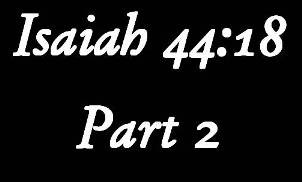 In our last post on Isaiah 44:18, “Why Is It So Hard to Translate Isaiah 44:18?” we posited the translation “They do not know; they do not understand because he plastered over their eyes so they cannot see, their hearts so they cannot understand.”
In our last post on Isaiah 44:18, “Why Is It So Hard to Translate Isaiah 44:18?” we posited the translation “They do not know; they do not understand because he plastered over their eyes so they cannot see, their hearts so they cannot understand.”
The all important question is: “Who is the HE in ‘he plastered over their eyes”?
The biggest problem that one has with interpreting this text, other than being drawn off by a poor translation that denies you the right to ask the question, is that most people assume the answer and do not drag themselves through the lengthy process of considering and testing the potential answers.
The tendency is for people to allow their own theological proclivities to determine the answer without investigation and second guessing. There are three possibilities. Calvinists favor one. Arminianists favor another. Spiritual Warfare aficionados will, perhaps, favor yet another.
What matters, however, is whether the text or other texts gives us any clues as to the intended meaning.
The context of Isaiah 44:18, found in Isaiah 44:9-20, what we might call “The Folly of the Idol Worshiper.” Here, the prophet Isaiah mocks the idiocy of the person who takes a tree, chops it down, burns part and carves another part into a god. He takes the log, chisels it into the shape of a deity and then cooks his food over the chips while prostrating before the remnants. This poor soul is blind and unable to save himself. He is unable to look at what he is doing and say, “There is a lie in my right hand! I’m worshiping a block of wood!”
Why can he not say this? Why can he not see this?—Because he plastered over their eyes so they cannot see, their hearts so they cannot understand.”
So, again, Who is the HE? There are three possible answers to this question drawn from either the immediate text or the general flavor of such Hebraic conversations.
He is the deceived heart of the worshiper: The heart of the worshipper shows up in Isaiah 44:20, as a masculine singular noun, reading, “He has been turned from the way by a deceived heart, so that he is unable to keep himself safe by saying, What I have here in my hand is false.” Declaring the “He” to reference the idol worshiper’s deceived heart, the interpreter declares the idol worshipper singularly responsible for his own blindness.
He is the Idol or god: Both the “idol” and “god” of the worshipper show up in Isaiah 44:17 as masculine singular nouns, reading, “And the rest of it he makes into a god, his idol, and falls down to it and worships it. He prays to it and says, “Deliver me, for you are my god!” Declaring the “he” to reference the god or idol focuses either on the role of the spiritual forces behind idols in ensnaring the idol worshipper in his chosen darkness, or the natural blindness that emerges from false worship itself.
He is YHWH: There are many texts in which a floating masculine singular pronoun is actually intended to reference God, whether or not He has shown up in the text directly or not. YHWH does not make any direct appearance in Isaiah 44:9-20, but that does not negate the possibility that the author intends to suggest that YHWH Himself has acted against the idol worshipper in light of the idol worshippers own embrace of pagan worship. This is expressed plainly in the NASB, reading, “They do not know, nor do they understand, for He has smeared over their eyes so that they cannot see and their hearts so that they cannot comprehend.” This is the one main reason that I do not favor capitalizing pronouns for God in translation. This practice is intended to represent respect, but ends up representing interpretation.
While Calvinists will prefer “He is YHWH,” and Arminianists will prefer, “He is the deceived heart of the worshiper,” and Spiritual Warfare aficionados will prefer, “He is the idol or god,” each is grammatically possible and each is theologically possible. The real question, which we will continue to investigate in another post will be, “What evidence can be glean from within the immediate text, from within Isaiah as a whole, and from texts outside Isaiah that might help us make a choice.
Even if we are not required to make a choice in the end, the exercise will prove invaluable.
Discover more from Biblical Literacy with Dr. Andrew D. Sargent
Subscribe to get the latest posts sent to your email.


